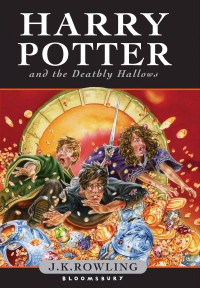Harry Potter and the Deathly Hallows

J.K. Rowling, 2007.
“It’s not literature…” “It’s just a mania…these books will be forgotten”. So have said some of the bon ton English literary critics.
The most interesting review I have read was in the Frankfurter Allgemeine Zeitung (FAZ), which devoted two-thirds of a broadsheet page to the book. It was a “straight” review, which concerned itself with what the book was about. The review begins by drawing attention to the quotations at the beginning. The first, from Aeschylus, ends:
Now hear, you blissful powers underground- answer the call, send help. Bless the children, give them triumph now.
Then Rowling quotes from William Penn’s Fruits of Solitude:
Death is but crossing the world, as friends do the seas; they live in one another still... This is the comfort of friends, that though they may be said to die, yet their friendship and society are, in the best sense, ever present, because immortal.
The FAZ suggests that the choice of these quotations reveals the importance for Rowling of the question: how one can live on after the loss of loved ones, and the knowledge of the inevitability of one’s own death? The title of their review is: Growing up means being able to die.
According to the FAZ, the author attempts to face the three great metaphysical questions: the boundary called death; the power of love; and the relationship between fate and “self-determination” (in the sense of the individual’s response to what life brings to him). In other words, what distinguishes us are our “decisions”- how in fact we respond. We are such as we determine to be: heroes or cowards, friends or betrayers. Rowling again and again is putting her characters in front of a choice between just being driven, or attempting to follow a chosen path.
I found it astonishing to see, after reading this last book, how throughout the series she had hinted at and deepened these questions, finally to confront both Harry and the reader with their shocking force.
I found it a very moving book, and continue to find myself often re-experiencing the emotional shock of the culmination of the story. It awoke a feeling of compassion- how difficult, for all of us- to live! And, how wonderful!
The FAZ challenges the final words of the book: “All was well”, by asking: can everything ever become well?
Tilo Ulbricht

A note on Pullman and Rowling.
Comparisons have been made between Pullman’s trilogy “The Dark Materials” and the Harry Potter series. I find that, only a few years after reading Pullman, no clear impression remains of any of the characters with the sole exception- and it is a telling exception- of the horrid mother. What are any of those people really like? No feeling for them. As I read those three books, with more and more revulsion, seeing more clearly how mentally contrived they were, and the increasingly strong vein of negativity running through them, I noted also the complete absence of real human feeling, and of humour. By contrast, the Harry Potter series is full of characters with all kinds of “good” and “bad” and indeed contradictory features, whom I remember, and on account of whose deaths I sorrow. And full of humour. I am going to read those seven books again, from the beginning (which, if you have never begun, you must know is essential).
